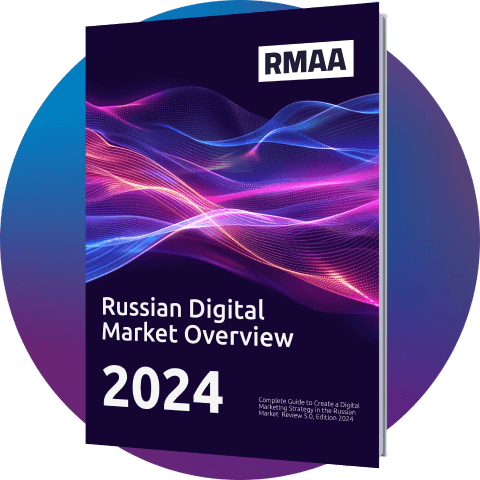Blog about successful marketing strategies in russia
Advertising Market Overview 2022


MEDIA BUYING
Share this Post
The tightening of the sanctions policy at the beginning of 2022, as well as the subsequent exit of foreign brands, significantly affected the Russian economy including the advertising market.
Many marketing agencies faced new realities (loss of customers, search for new promotion channels, etc.) and were forced to adjust to them at the earliest possible juncture. While experts “predicted” a significant cuts in advertising budgets and volumes of advertising procurement at the end of the first quarter of 2022.
Thus, the president of the Association of Communication Agencies of Russia (ACAR), Sergey Piskarev, in an interview with RBC, expressed the opinion that the market decline can be from 30% to 70% this year. At the same time, the expert noted that though the situation is unstable, but still the volume of advertising has not returned to the indicators of 2008. And this still gives hope to get out of the situation with minimal losses by the end of 2022.
Of course, it is too early to talk about long-term forecasts about the development of the market. Nevertheless, it is already possible to make some conclusions about how the advertising industry has changed over the past 6 months. RMAA experts conducted their own expertise based on all the analytical data on the Russian market at the current moment to show what progress had been made by domestic advertisers and what serious problems they had faced over that time period.
A Good Start. January-March 2022
At the beginning of the year and up to the moment when foreign brands began to leave the market, the advertising business in Russia showed steady growth as evidenced by the data of the Expert Commissions of the Association of Communication Agencies of Russia (ACAR). Speaking in numbers, the total volume of advertising on the Russian market amounted to about 130 billion rubles (5% more compared to the same period in 2021). However, in March, the indicators fell to negative values for the aforementioned reason. Also, this decline has had a different impact on each market segment.
Online Advertising
According to experts, online advertising has suffered the most. In March of this year, the segment faced a simultaneous reduction in supply and demand (communication channels, etc.) for the first time because foreign advertisers and advertising platforms left the market. Recall that the leading companies ranking the TOP 10 by volumes of advertising budgets have left the market (Nestle, Reckitt Benckiser, PepsiCo, Procter & Gamble, Coca-Cola, McDonald's, etc.). Plus, many foreign communication channels (Meta*, Google and all their services, Twitter, TikTok, etc.) have become closed for the Russian market. Therefore, advertisers quickly began to adapt to the current realities and seek alternative ways of promotion. In many ways, the use of domestic services, which have been able to improve their functionality in recent years, contributed to the improvement of the situation. Due to this, the first quarter of 2022 ended with positive growth indicators for the Internet advertising market.
According to the Yandex report, revenue of the company's online advertising amounted to 41.7 billion rubles for the first quarter of 2022. Herewith, the total revenue increased by 45% compared to 2021 (106 billion rubles). Another Russian holding Mail.ru, which owns popular resources VKontakte, Odnoklassniki, My World, etc., received 11.1 billion rubles from advertising for the period from January to March 2022 (in the same period in 2021, the indicator was at the level of 10.4 billion rubles). What is more, the rapid growth of advertising revenue was shown by Telegram, the turnover of which amounted to 7.45 billion rubles at the end of 2021.
TV Advertising
During the same period, the TV advertising segment developed in almost the same way as in 2021. It means that it showed sustainable growth due to the federal channels and advertisers, as well as thematic TV. Dynamics of television advertising exceeded the average market indicators at the beginning of the year. Then, at the end of March, the segment demonstrated general slowdown in activity, but it did not significantly affect the growth of its volumes.
“The growth of the cumulative volume in the first two months of the first quarter (January-February) was observed resulting from an increase in budgets in the sports segment and sponsorship.” - Andrey Chuvaev, director of Havas Village said in his interview with the portal Sostav.ru.
Out Of Home
As in the case of TV advertising, the Out of Home segment (i.e. “outdoor advertising”) did not significantly lose its budgets in the first half of 2022. But it also did not show the “traditional” seasonal growth of commercial loading for this period. Despite the fact that the share of brands that left Russia in outdoor advertising has always been relatively low, cancellation of some advertising campaigns in the segment affected the overall dynamics of the market as a whole.
Radio Advertising
In the first quarter of 2022 radio advertising changed its focus to regional and ended the period with higher indicators than in Moscow and network placement segments. This trend can be explained by the fact that the regional market mainly works with Russian advertisers. As a result, it turned out to be more resistant to all economic changes in general. Whilst the leading category of car advertising aimed at promoting foreign brands left the network radio. The drivers of radio campaigns in the first quarter of 2022 were mainly real estate and financial sectors. In addition, RACA (Russian Association of Communication Agencies) experts noted higher growth dynamics for special projects that were broadcast on various radio stations. By the way, the same trend was observed in 2021.
“The first quarter cannot be considered too indicative for the radio segment. Since, all economic and political events took place almost at the end, and in March many advertisers took a wait-and-see attitude. Carryforward and removal of budgets was minimal and mainly affected the federal market, because it is where international brands that subsequently fell under sanctions concentrate.” - Ekaterina Rybakova, ADV Press&Radio Media Directoor said - in an interview with the information amd analytical portal Sostav.ru
Print Media Advertising
In the print media segment, the volume of revenue from advertising in magazines remained almost at the level of 2021 at the beginning of the year. However, overall results for press advertising turned out to be ambiguous. The case is that experts denoted a budget reduction in newspaper advertising budgets. But when calculating the results, publishers' revenues from native advertising and special projects were not taken into account. Actually, the latter were implemented in large volumes by many federal media in February-March. According to Marina Mishunkina, First Deputy General Director of the Publishing House “Arguments and Facts" in an interview with the portal Sostav.ru ), this refers to approximately 55% of the revenue from such projects overall on the market.
The advertising market completed the first quarter of 2022 with such indicators. Along with it many experts predicted a further decline in all segments (in an interview with Vedomosti). Moreover, the depth of the drop directly depends on the duration of the hot phase of the sanctions policy against Russia. For example, OMD OM Group calculated that each month of such a situation would cost Russian advertising a decline of 5% at an annual rate. At the beginning of the year Dentsu Russia experts suggested that the April-May period could be 40-60% compared to 2021. On the other hand, the exit of foreign companies allows local brands to increase market share.
Ekaterina Gorkina, Business Development Director of Igronik, suggested another case scenario. In her opinion, the future of the market directly depends on the appearance of new logistics chains for companies from China, Turkey, Brazil and India. Anna Sergeeva, CEO of Main Target Group, is also sure that in the near future the market will replace the budgets of large Western companies with medium-sized advertisers. Since such players are less dependent on the geopolitical situation in the world.
It should be that some forecasts about the fall of the market as a whole came true in the second quarter of 2022. However, there were also positive results.
What Happened Next. April-June 2022
As it was expected, the advertising market in Russia accelerated its decline up to 45% in the second quarter. Such data was published by Kommersant, based on OMD OM Group study. In general, the industry lost about 190 billion rubles (- 26%) in the first half of the year.
Continuing the trend of the first quarter of the year, the largest decline occurred in the segment of online advertising (-34% for the first half of the year) and, according to experts, amounted to 91 billion rubles. Press advertising turned out to be in the second place in terms of losses (-29% for the same period) with a mark of up to 3 billion rubles. TV advertising and Out of Home investments decreased by 17 and 18%, respectively. But radio advertising suffered the least, having decreased in volume by only 3% in the first half of the year (up to 6 billion rubles).
Based on these data, OMD OM Group analysts forecast an overall decline in the advertising market by 33% by the end of 2022. Moreover, experts are sure that the biggest decline will occur in print advertising (by 57% for the whole year). However, all other market segments will also be greatly affected: Internet advertising will lose 43%, TV advertising will go down by 22%, Out of Home will go down by 24%. And again, radio advertising (minus 3%) will come out to the beginning of 2023 with the least losses.
If we talk about the situation on the market in general, it should be mentioned that it was not only the exit of foreign companies that affected it. The subsequent uncertainty for other players in various segments, including Russian companies, also forced many advertisers to reduce their budgets for promotion. As evidenced by the findings of the Tochka Bank research showing the dynamics of advertising investments for domestic companies in March-June 2022 (the results were published in the Kommersant newspaper).
Analysts found out that the promotion costs in the education category most reduced (minus 74%). For example, in March 2022, Netology a major Russian online education platform, reduced the advertising budget by 20% amid general restrictions, as well as blocking Google Ads and Facebook** cabinets, which the company used for marketing activities.
The second place in the study was taken by the category of advertising and PR agencies, media publishers and typographers - minus 68.8% of advertising budgets for promotion. Following them, there were public organizations that reduced advertising costs by 66%. Then, auto dealers (minus 55%), book publishers and museums with libraries (minus 47%), tourism (minus 39%). The category of cafes, restaurants and hotels closes the list with an advertising budget saving of 37% at the moment.
Representatives of the above mentioned segments accept such findings. By the way, car market participants began to reduce advertising budgets in early February 2022 due to the uncertainty associated with the deliveries of cars. This is stated by Andrey Kamensky, Marketing Director of Avilon AG (in an interview with Kommersant), adding that the issue also consists in the need for new advertising tools to replace the blocked Google and Meta* services. At the same time, Oleg Kuznetsov, Marketing Director of Avtodom Group and Avtospeccenter Group (in an interview with Kommersant), clarifies that the reduction of advertising costs in the car market occurred mainly in the category of premium European brands. Meanwhile, the budgets for the promotion of Korean, Chinese and Japanese manufacturers, on the contrary, have increased.
In the tourism sector, as well as in the car market, there has also been a change of priorities. Dmitry Gorin, vice president of the Russian Union of Travel Industry (in an interview with Kommersant), noted that advertising budgets in the segment have reduced amid general market decline. Despite this, domestic online services, on the contrary, increased advertising activity amid Booking.com and Airbnb. exit from the market. Besides, some companies have started actively looking for new promotion channels for themselves. For example, Tvil.ru, a tourist platform, launched TV advertising for the first time and expanded the coverage of outdoor advertising from 3 to 10 cities. It was said by Oksana Shustikova, a service representative, to Kommersant.
During the same period, a global “restructuring” of channels and services started in the online advertising segment.
New Digital Inventory
Amid blocking foreign advertising services, Russian companies faced challenges in promoting at the beginning of 2022. However, the situation was resolved in a fairly short time, since domestic platforms were able to quickly offer alternative solutions. Besides, the activity of Russian users on these services has also begun to increase.
According to a study by Tochka Bank, advertising costs on Telegram increased by 591% in March-June of the current year (compared to the same period in 2021). The same indicator of another domestic service, VKontakte, turned out to be slightly lower - plus 146%. Analysts explain these figures by the fact that Russian advertisers have almost completely give up on Google and Meta* tools. Since in March-June, the volume of payments on these services decreased by 96 and 99%, accordingly. However, Telegram and VKontakte should also be commended, since service developers are actively implementing new advertising systems on their platforms. In 2021, TelegramAds appeared. In the first half of 2022, VKontakte launched a support program for young authors, simultaneously developing a full-fledged version of the VK Video application.
The Russian video service, Rutube, also announced an influx of users and new features in 2022. According to Yulia Talapanova, Director of the Marketing Communications Department of the platform (at the Russian Internet Forum (RIF)), Rutube developers planned to attract about 10 million active users by the end of 2022. Meanwhile, in March, the audience has already exceeded the mark of 21 million people. Moreover, the number of content views increased by 70%. Against this background, there is a new option for the authors to transfer videos from Youtube and quite comfortable monetization conditions (the blogger receives 100% of the earned amount in the first 6 weeks from the moment of registration).
It is worth saying a few words about another Russian platform - Yandex, which offers authors, companies and advertisers a huge functionality for content placement. In May of this year, about 355 million Russian users benefited from Yandex services. During the same period, the project developers added new functions, providing more convenient promotion options on the services. For example, the number of product spaces on Yandex.Direct has been increased (to increase the number of advertisers), two new formats of advertising banners have appeared, as well as Yandex.Metrica has been updated to provide more accurate analytical indicators.
Special attention should be given to new platforms. Some of them already have a huge number of users and advertising opportunities. A good example of this is the social network TenChat, whose audience has grown ten times in a couple of months since its official release. In January 2022, the number of TenChat users reached 100 thousand, and in March this figure was already at the level of 300 thousand. In May, the developers released a new version of the service, providing additional features (stories, profile links, statistics, etc.). Besides TenChat, blogging services have been launched on the marketYappy! andIRus, gradually gaining popularity among the Russian audience.
Ambiguous Result for the First Half of 2022
On the one hand, leading foreign companies with large media coverage have left the advertising market. Which led to a fall of budgets in many segments. Moreover, Internet advertising suffered the most, since almost all communication channels were blocked here. But on the other hand, new brands are starting to come to Russia, which need a Russian audience and large reach. In addition, domestic companies are gradually thinking about new promotion strategies in the current realities. Of course, in most cases they are held back by the uncertain situation on the market as a whole. However, it is too early to talk about a global market decline by the end of 2022. Since the same segment of online advertising managed to “increase” indicators and new inventory in the form of high-quality services offering various functionality for both users and advertisers in a relatively short time.
In any case, effective promotion on the Russian market will depend on many factors, features, trends and analytical data. Entrust this task to RMAA specialists who will be able to provide an integrated approach to ensure that your product reaches the attention of Russian customers in a short time.
* The organization is recognized as an ex-extremist and is banned in Russia.
** The social network is recognized as extremist and banned in Russia.
Join 2,000+
of your Peers!
You will be the first to know about Russian marketing insights, news and updates from our agency. Stay tuned!
Get our latest articles delivered to your email inbox and get our exclusive White Paper
"A media buyer's quick guide for effective work in Russia"
for FREE!
Russian Digital Market Overview
Strategic Insights into Russian Digital Marketing Landscape

Ready to partner with the specialists in Russian marketing and advertising?
About the Author
A content lead. Natalia runs marketing projects promotion with different digital tools in the Russian-speaking market.
Join 2,000+ of your Peers!
Get our latest articles delivered to your email inbox and get our exclusive White Paper "A media buyer's quick guide for effective work in Russia?" for FREE!
You will be the first to know about Russian marketing insights,
news and updates from our agency.
Stay tuned!
We're updating our website's design step by step, so some pages may look different. Thank you for your understanding.
Got it














